The Digital Marketing Benchmark Report 2024 offers an extensive analysis of the digital marketing landscape, gathering insights from over 500 marketing professionals. It outlines their understanding and applications of various marketing channels, technologies, and digital marketing tactics, their repercussions for the industry, and their forecasts for its future.
This report extends beyond our annual survey, which assembles crucial industry data, by integrating findings from our partners and other relevant industry reports.
The result is a comprehensive understanding of the market dynamics of Digital Marketing. We are covering the following main areas:
- Digital Marketing Channels
- Marketing Technologies
- Social Media Marketing
- Data and Analytics
- Sustainability and Ethical Considerations
In the face of the Covid-19 pandemic followed by widespread inflation and economic woes, businesses have been compelled to innovate and evolve to manage economic turmoil and operational challenges. This necessity for change has further fueled digital transformation, making digital marketing an indispensable tool for brands to nurture meaningful connections with consumers.
Notable advancements in the digital marketing landscape include the growing role of AI. For instance, leading marketing platforms have started to integrate with AI language models, introducing advanced features that revolutionize customer interaction and personalization.
Simultaneously, emerging technologies in social media marketing are creating new opportunities for brands. With the rapid growth of platforms like TikTok, marketers are finding unique ways to engage with their audience and boost their ROI.
As we progress, we anticipate these developments to continue shaping the industry in unprecedented ways, presenting new opportunities and challenges for marketers.
Digital Marketing Benchmark Report 2024:
Key Findings
This section highlights the most significant findings from our research, shedding light on the current landscape of digital marketing. The key findings include:
- A large majority (59.2%) of businesses are using sustainability in their marketing, with a further 27.6% planning to do so.
- Remote work has improved digital marketing for 67.1% of businesses.
- Key skills for digital marketers: Content Creation and Storytelling (34.2%) and Data Analysis and Interpretation (25.0%).
- To address data privacy, businesses are updating transparent privacy policies (42.1%) and strict data handling/storage (30.3%).
- Digital marketers claim to receive their highest digital marketing ROI from social media marketing (38.5% support this). However, SEO consistently ranks better for contribution to overall marketing objectives and cost-effectiveness.
- Affiliate marketing is an outlier in these statistics. Many rank it as being the least effective channel with the worst cost-effectiveness. However, a sizable minority ranks affiliate marketing as the best channel for both outcomes. This suggests that brands who opt to use affiliate marketing find it very successful, however many other brands consider it irrelevant to their goals.
- The majority of marketers now consider using AI in some form in their marketing activities. More than half (53.8%) plan to use AI and machine learning tools in the next few years, and many already use other types of AI, such as chatbots, virtual/augmented reality, and voice search technology.
- Video, both long-form (55.1%) and short-form (38.4%) is considered essential for successful social media marketing. There has been a notable decrease in the use of images (33.3%) in social posts recently. This change is reflected in the rise of TikTok and YouTube as popular social channels for brands, and the reduction in the use of Instagram for marketing purposes. The old favorite, Facebook, is making a renaissance, however.
- The biggest challenges in digital marketing today: increasing competition (27.1%) and lack of budget (25.4%). Looking further ahead, the biggest challenges are adapting to tech changes (55.1%) and privacy and data security concerns (39.7%)
- Although a bare majority of respondents have fully transitioned to Google Analytics 4 (GA4), a further 18.2% are in the process of transitioning. Of those who haven’t yet transitioned, 23.4% say they plan to upgrade soon. It is concerning, however, that these figures are not higher, considering that Google has now switched off the earlier Universal Analytics software.
Executive Summary
The evolving world of digital marketing mirrors the fast-paced technological revolution, creating seismic shifts in how businesses engage with their customers. This transformation of marketing operations aligns with the overall changes that technology has brought to our workplaces, empowering human workers with tools to augment their abilities and reach new heights in their roles. Much like how industrial machines amplified human physical capabilities, modern digital marketing tools enhance human creativity, data analysis, and consumer engagement capacities.
The 21st century has witnessed the transition from traditional to digital marketing, similar to how farmers transitioned from traditional to digital practices within a few short decades. In both cases, technology has drastically reshaped the landscape of work and activity mix. The data from this report paints a vivid picture of this transition, illustrating how businesses are adapting and thriving amidst these changes.
Digital marketing mirrors the rise of digital technology in other sectors; it’s a shift driven not merely by the availability of new technologies but their proven effectiveness in achieving marketing goals.
The marketing strategies and tactics employed by companies have transformed as well. Content marketing and social media marketing now stands as the top strategies. This reiterates the fact that, just as technology has amplified the physical and cognitive powers of workers, it has also amplified the ability of marketers to engage consumers with relevant and impactful content. Businesses then use social media to publicize and successfully deliver their content.
However, the world of digital marketing is not without its challenges. Despite adopting advanced digital strategies, many businesses still struggle to measure the ROI of their marketing efforts. This mirrors the general challenges in technology adoption, where the existence of a new technological solution doesn’t necessarily translate into immediate and effective integration into existing systems.
Data and analytics have become the mainstay of digital marketing. As the digital age progresses, it’s becoming clear that data is the superpower that today’s marketers need. With the transition from Universal Analytics to Google Analytics 4, businesses are on varying steps of the adoption ladder. But the trend is clear – businesses are embracing the power of data and analytics to make informed decisions.
Furthermore, sustainability and ethical considerations have taken the front seat in the digital marketing world, mirroring the wider societal focus on these aspects. The world is increasingly conscious of its environmental footprint and data privacy. Businesses are responding to this by incorporating sustainability in their strategies and focusing on ethical data handling.
The remote working trend, a phenomenon accelerated by the recent global pandemic, mirrors a larger shift towards virtual engagement and communication, positively impacting digital marketing practices. This transformation is yet another example of how technology is reshaping the nature of work, making us rethink the traditional workplace paradigms.
Methodology
To ensure accuracy and reliability, this benchmark report is based on a robust methodology, including both primary and secondary research. Our primary research involved a survey conducted on our homepage, where we gathered insights from 500 marketers specializing in digital marketing. The survey included questions related to strategies, challenges, and effectiveness of various marketing channels. In addition to the survey data, we also analyzed industry reports, case studies, and expert opinions to provide a comprehensive analysis.
Part 1 – Digital Marketing Channels: An Analytical Examination of the Marketing Mix
Understanding the Landscape of Digital Marketing Strategy in 2024
Digital marketing channels form a complex network, each contributing its unique value to a company’s overarching online strategy. It is critical to understand how these channels are utilized, which provide the most return on investment (ROI), and how marketing budgets are being allocated among them.
To provide such insight, a comprehensive analysis was undertaken, studying a diverse range of companies and their digital marketing strategies. This data, refined through robust quantitative techniques, illuminates the marketing channels most heavily leveraged by businesses, their perceived ROI, and the distribution of marketing budgets among these channels.
Prominence of Social Media
In line with the digital age, social media marketing has become a dominant marketing channel, employed by many companies in our survey. This can be attributed to the diverse range of platforms available, each with unique audience demographics and engagement tools. From the broad reach of Facebook to the focused professional network on LinkedIn, companies have a multitude of options to personalize and target their marketing campaigns effectively.
In addition, a study titled “Impact of Social Media Marketing Activities on Online Purchase Intention” found that specific social media marketing activities such as creating entertaining, engaging, trendy, and personalized content significantly influence consumers’ purchase intentions (Chuah et al., 2023).
These tactics that resonate with audiences and inspire action are likely drivers of social media’s prominence as a marketing channel. By leveraging these methods, businesses can increase audience interaction, strengthen brand loyalty, and ultimately drive sales.
The Successful ROI of Social Media
Last year, when considering the comparative ROI of various marketing channels, the analysis revealed an unexpected leader. Search Engine Optimization (SEO), despite being the third most utilized channel, yielded the highest ROI at 29.2%. This finding underscored the importance of SEO in driving sustainable business growth. By attracting high-quality organic traffic, SEO can generate a significant return on investment.
This year, while SEO is still as important as ever, fewer see it as delivering the highest ROI of the digital marketing channels. Indeed, only 10.3% volunteered SEO as the ROI leader this year (compared to 29.2% a year ago).
Business leaders have traditionally struggled to understand how to measure ROI from social media. Many considered it too nebulous, and for a long time, organic social media lacked a straightforward measure. However, social media is now well-established in the marketing landscape and there is a better understanding of its importance to businesses.
Digital marketer, Neal Schaffer, emphasizes that social media marketing has the potential to have a high ROI because it usually requires a small up-front investment (compared to other marketing channels), but may provide a significant amount of money or customers in return. “Social marketing efforts can require little more than time, creative energy, and free products for influencers or giveaways in some cases, while receiving a virtually limitless number of customers viewing and possibly purchasing products.”
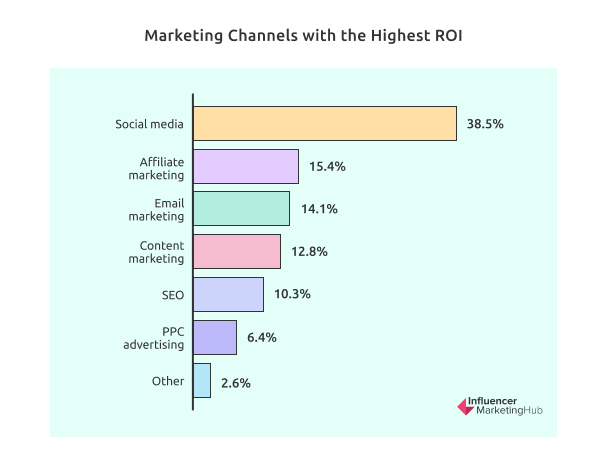

Contributions to Marketing Objectives and Cost-Effectiveness: The Value of SEO
Upon delving deeper, the data reveals further complexity. With an average rank of 2.19 (1 = highest, 6 = lowest), SEO is still seen as most effective in fulfilling overall marketing objectives. In addition, it is viewed as the most cost-effective channel (average rank of 2.3). The ability of SEO to align with user intent is likely a significant factor contributing to its high performance.
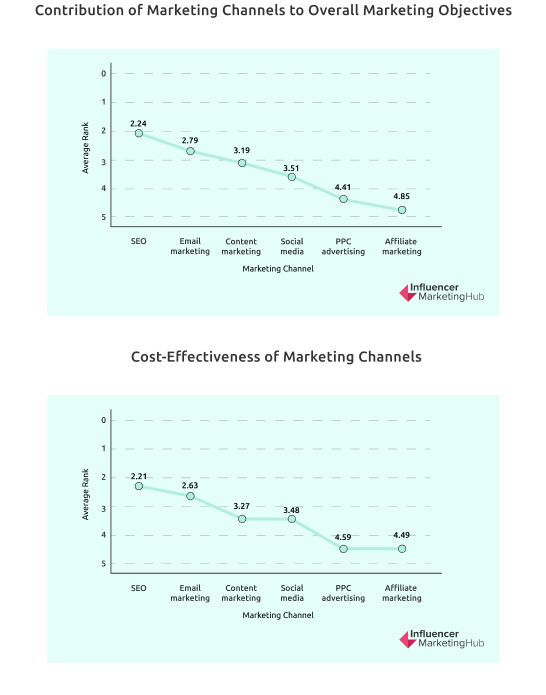

The Cost-Effectiveness of Marketing Channels shows a similar pattern to the Contributions of Marketing Channels to Overall Marketing Objectives, with the notable exception of content marketing being considered more cost-effective than social media marketing.
Customer Experience Strategy Prioritization: The Role of Feedback and Personalization
As we traverse the digital landscape, it becomes apparent that an effective customer experience strategy is pivotal. Our analysis reveals that businesses prioritize personalization (38.5%) and customer journey mapping (32.1%) as key strategic elements. This is a change from last year, where businesses prioritized customer feedback systems (42.0%) and personalization (37.4%) as key strategic elements. Despite this change (and the reduction of interest in customer feedback systems), this still illustrates the importance companies place on understanding customer perspectives and delivering tailored experiences.
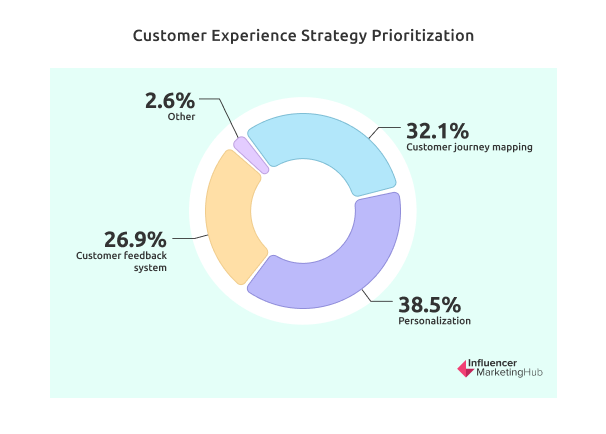

Budget Allocations: A Fair Distribution
This year we observe a reasonably direct relationship between the effectiveness of a marketing channel and the budget it receives. Marketers see social media as the most effective channel and have budgeted accordingly (39.5). However, the analysis also recognizes the effectiveness of SEO, resulting in marketers allocating it the second-highest proportion (15.8%) of their total marketing budget.
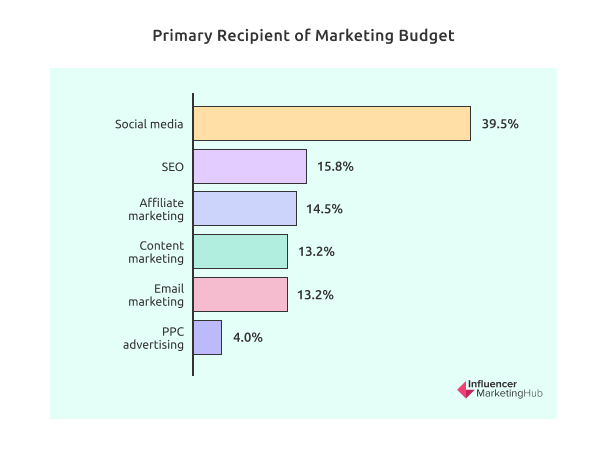

Integration of Multi-Channel Marketing Efforts: Striving for Seamlessness
We also delved into how businesses are integrating multi-channel marketing efforts. Most companies strive for a moderate integration level (38.5%), focusing on consistency but acknowledging some gaps. Simultaneously, a significant portion of businesses (34.6%) successfully provide a highly integrated, seamless experience, illustrating a growing recognition of the importance of a coherent, multi-faceted marketing approach.
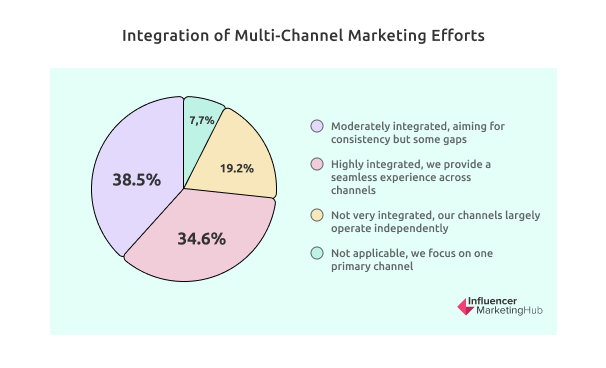

Ongoing Analysis and Future Research
This study provides a detailed look into the complex array of digital marketing channels. It highlights the significant roles each channel plays in crafting a company’s digital marketing strategy and the importance of understanding each channel’s strengths in relation to the organization’s unique objectives.
The findings should not be interpreted as an encouragement to focus on a single channel. Rather, they should serve as motivation to evaluate and potentially recalibrate existing marketing strategies. The low budget allocation to SEO, despite its high ROI, signals one such area for review.
While the study offers valuable insights, it also raises questions worthy of further exploration. The paradoxical relationship between social media usage and ROI is one such area. Is this a universal pattern, or does it fluctuate based on variables such as industry type, target audience demographics, or the social media platforms utilized?
As the landscape of digital marketing continues to evolve, marketers must remain adaptable, altering their strategies to harness new developments. Future research should continue to investigate the fascinating world of digital marketing, offering valuable insights
Part 1 – Summarized
- Marketing Channels with the Highest ROI
Social media leads in generating the highest ROI (38.5%) and is the most utilized channel. SEO, despite being considered highly important by marketers, yields only the fifth-highest ROI (10.3%). - Contribution of Marketing Channels to Overall Marketing Objectives and Cost-Effectiveness
SEO is rated highest in both contributing to marketing objectives (2.24 average rank) and cost-effectiveness (2.21 average rank), demonstrating its efficiency as a marketing channel. - Primary Recipient of Marketing Budget
Despite its high contribution to marketing objectives, SEO only receives 15.8% of the marketing budget. Social media, the most utilized channel, is the primary recipient of marketing budgets at 39.5%.
Part 2 – The Technological Frontier: Marketing Technologies in Focus
Pioneering Technologies: CRM, CMS, and Marketing Automation
From customer relationship management (CRM) to marketing automation, technology has revolutionized the digital marketing landscape, introducing powerful tools that allow marketers to streamline, optimize, and scale their efforts. Within this technological arsenal, CRM Systems, Content Management Systems (SMS), and Marketing Automation Tools have proven particularly critical, commanding usage rates of 44%, 36%, and 31% respectively.
The increase in the importance of content management systems (CMS) is particularly notable this year. Last year this category held the bottom position in our list (with only 21.4% support). However, this year 36% of our respondents consider their CMS their most critical marketing technology. That makes sense when you think about it. If you have a WordPress website (and according to W3 Techs, 45.8% of all websites use that technology), then you’re going to consider it vital to successful marketing.
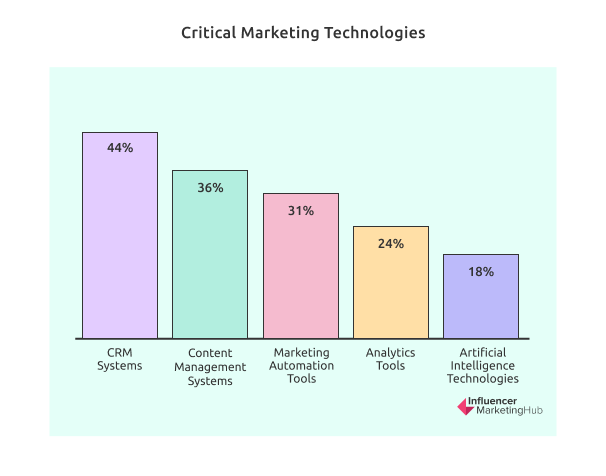

The Vanguards of Tomorrow: Anticipated Technological Evolution
Our exploration does not stop at the current state of marketing technologies. We look beyond, casting our gaze into the future. We find that marketers are bullish about the future evolution of marketing technologies. In fact, a significant proportion of respondents (49%) anticipate substantial growth in the field over the next 2-3 years, with a further 16% believing that it will increase slightly.
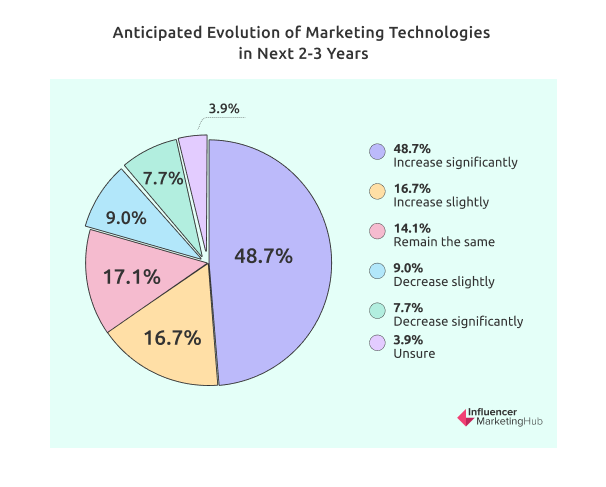

AI Takes the Spotlight: The New Frontier
As we continue our journey into the future, we encounter a rising star: Artificial Intelligence (AI). Our data indicates a strong propensity among companies to adopt AI and Machine Learning Tools, with 53.8% (up from last year’s already strong 44.3%) planning to do so within the next 2-3 years. From personalized marketing to predictive modeling, AI is set to redefine the boundaries of what’s possible in digital marketing. It’s also notable that blockchain technology appears to be decreasing in importance to our respondents, with just 16.7% (down from 19.8) looking to invest in that area over the next two to three years.
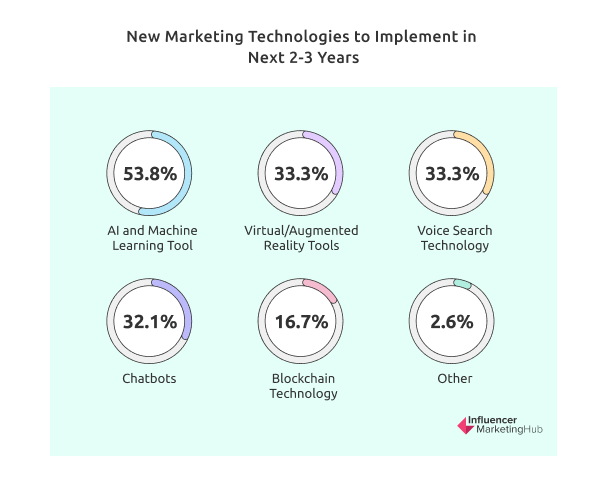

Tripping over Hurdles: Challenges in Technological Adoption
Despite the optimistic outlook, companies do face substantial challenges in adopting new marketing technologies. Finding suitable staff tops the list, with 32.1% of companies reporting a lack of skilled personnel. This is followed closely by budget constraints (25.6%) and the rapid pace of technological change (17.9%). Concerns about the lack of skilled personnel have increased markedly this year when compared to last year (18.3%).
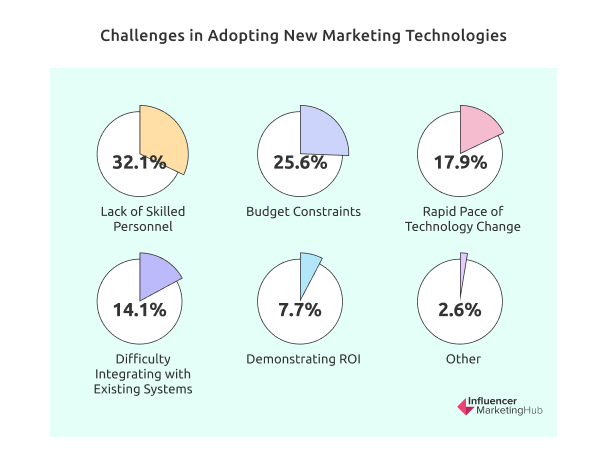

Unshakeable Confidence: Adapting to New Technologies
Even with these hurdles, companies display robust confidence in their ability to navigate the technological landscape. An impressive 54.6% of respondents are ‘very confident’ about their ability to adapt to new marketing technologies, with an additional 18.2% somewhat confident.
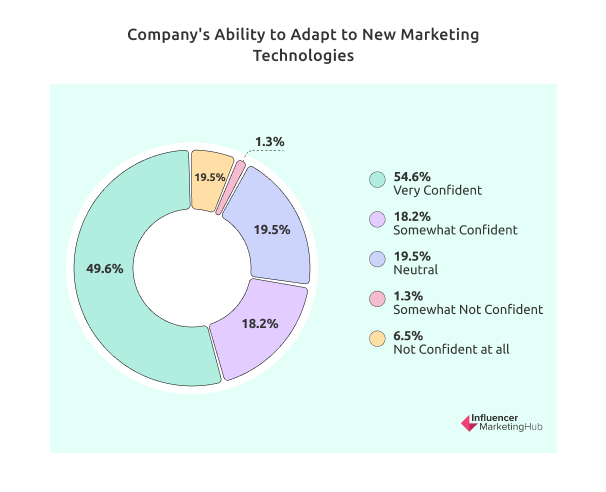

Beyond Technological Adoption: Challenges and Opportunities in Digital Marketing
Even as companies grapple with technology-related issues, they face additional challenges in their broader digital marketing efforts. The leading issues here include increasing competition (27.1%), the lack of budget (25.4%), and talent acquisition (23.7%).
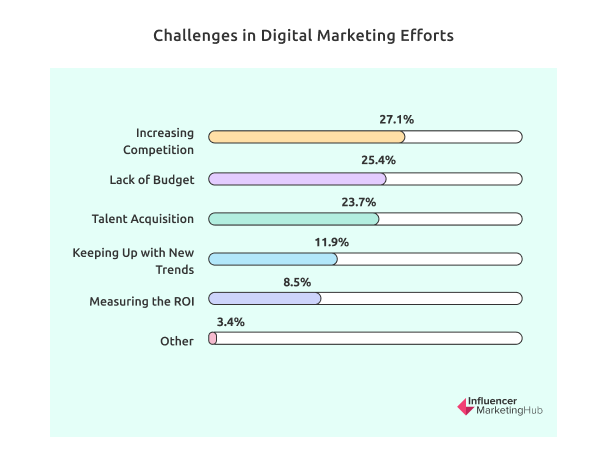

Looking ahead, respondents perceive adapting to technological changes (55.1%) and privacy and data security concerns (39.7%) as the biggest challenges for digital marketing in the coming years. Concern about adapting to technology changes is notably higher than in last year’s survey.
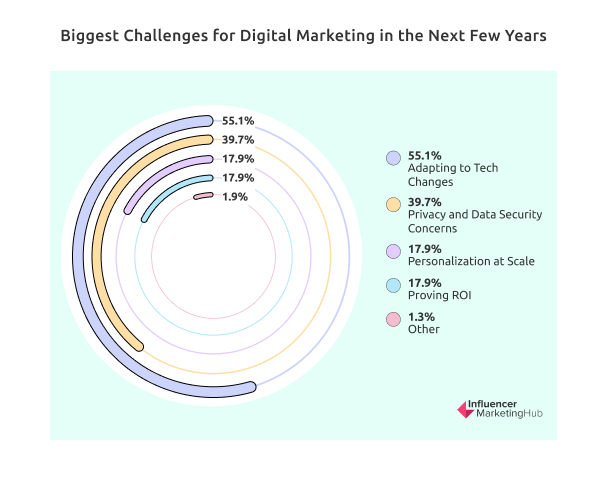

But it’s not all challenges and hurdles. Companies also see exciting opportunities on the horizon. Social media (30.8%) and AI and Automation (28.2%) emerge as the most significant opportunities for digital marketing in the future.
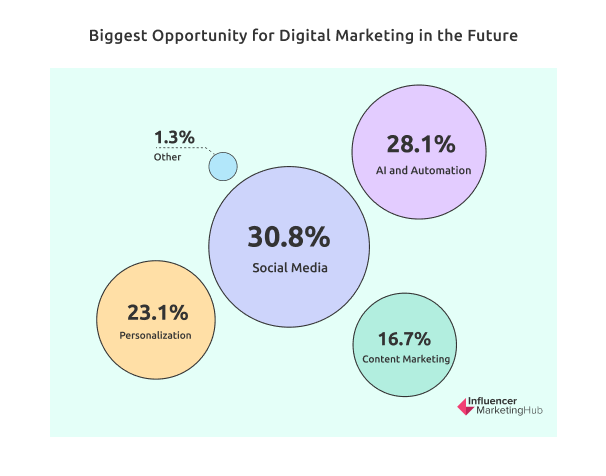

AI’s Grand Entrance: Performance Marketing Strategies
As AI takes center stage, companies are beginning to experiment with AI in their performance marketing strategies. Leading the way are automating bidding in real-time advertising (33.3%) and personalizing website content based on user behavior (29.5%). There has been a notable increase in support for using AI for content generation (28.2% up from 20.6%). This probably reflects the increased use of generative AI in products like ChatGPT and the Adobe Suite.
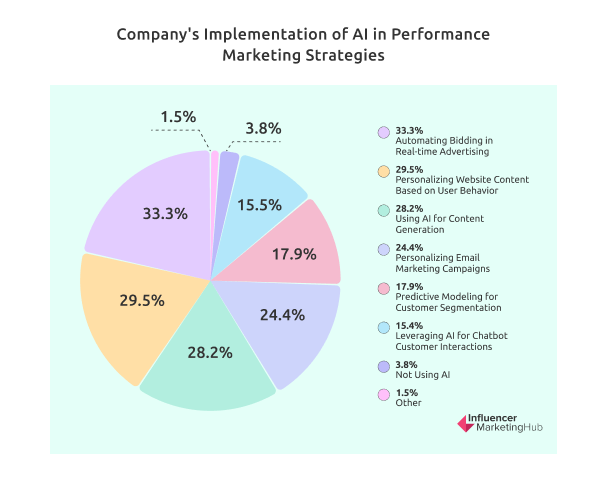

But how effective are these AI implementations? On a scale of 0 to 5, 34.6% of respondents rate their effectiveness at the highest level. This suggests a high degree of satisfaction with AI in performance marketing.
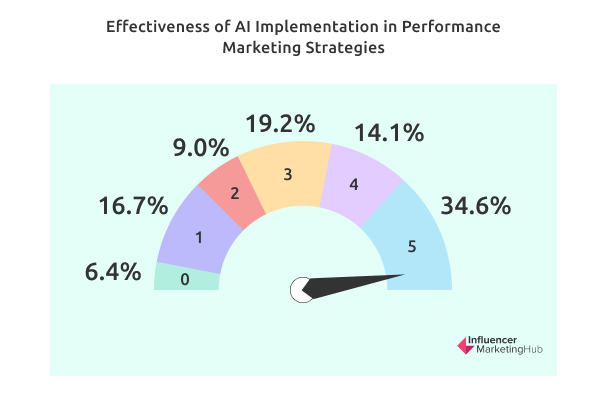

Naturally, the integration of AI into marketing strategies does not come without challenges. Difficulty integrating AI technologies with current systems and lack of expertise in the team (both 43.63%) top the list. One pleasing change we saw this year was that budget constraints are now only a challenge to 14.1% of our respondents, down from 19.8% last year.
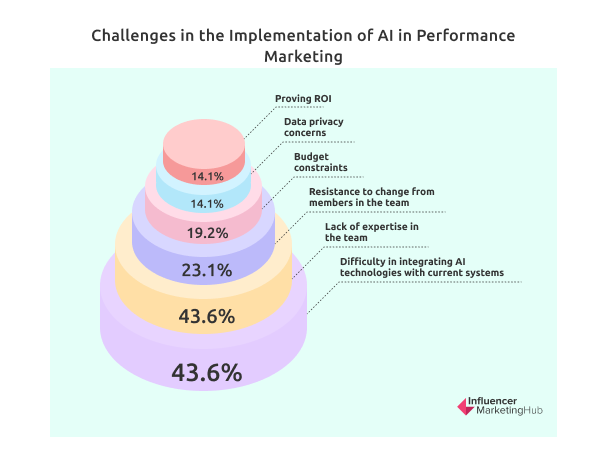

In conclusion, while technology, and in particular AI, presents exciting opportunities for digital marketing, its adoption is not without challenges. From integrating new technologies with existing systems to budget constraints and the rapid pace of technology change, companies must navigate a complex landscape. But if navigated successfully, the rewards promise to be substantial.
Part 2 – Summarized
- Critical Marketing Technologies
CRM Systems and Content Management Systems emerge as the most crucial technologies with respective usages of 44% and 36%. - Anticipated Evolution of Marketing Technologies
Significant growth is expected in the marketing technologies field in the next 2-3 years, with 48.7% expecting a significant increase. - New Marketing Technologies to Implement
AI and Machine Learning Tools lead the pack, with 53.8% of companies planning to implement them in the next 2-3 years. - Challenges in Adopting New Marketing Technologies
Lack of Skilled Personnel (32.1%) and budget constraints (25.6%) are identified as the most substantial challenges. - Company’s Ability to Adapt to New Marketing Technologies
Despite the challenges, most companies are very confident (34.6%) in their ability to adapt to new technologies.
Part 3 – Social Media Marketing: Unlocking Opportunities in the Digital Age
Understanding the Role of Social Media in Marketing Strategy
In the digital world, social media has become an indispensable tool for businesses to reach, engage, and convert their target audiences. Its proliferation has facilitated the development of a dynamic and versatile marketing landscape, allowing brands to connect with consumers on an unprecedentedly personal and immersive level.
To unearth the full potential of social media in the current marketing climate, our analysis takes a deep dive into the various platforms used, their effectiveness in achieving marketing goals, the types of content that generate the most engagement, the emerging technologies being utilized, and the challenges marketers are facing.
Social Media Platforms: Popularity and Efficacy
We saw a notable change in the social media platforms used for marketing activities this year, with TikTok jumping to a clear lead with 60.3% usage (up from third place and 49.6% last year). Facebook kept the second-place spot (46.2%), followed by YouTube (up noticeably to 41.0% usage).
Perhaps the most interesting change, however, is that the most popular social media platform for the last few years, Instagram, appears to have fallen out of favor with marketers, dropping to fourth place with 38.5% usage (a sizable drop from last year’s 51.9%).
Each platform offers unique features, facilitating different content types and interaction modes that appeal to diverse audience segments.
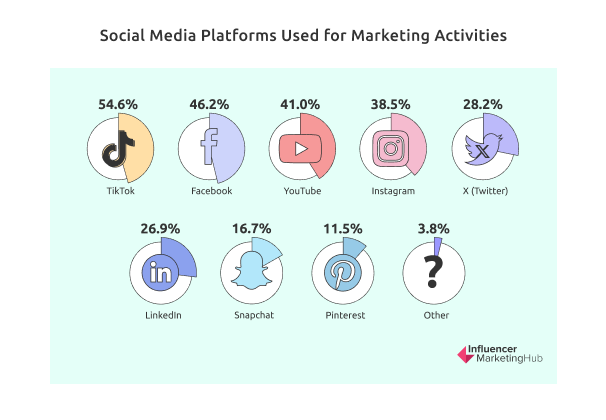

When it comes to efficacy, Old Faithful, Facebook, tops the list (27.6%), although TikTok is also considered relatively effective (22.4%). YouTube is also viewed highly (21.1% ranking it as their best channel). Instagram has tumbled according to this measure too, into fourth place, only preferred by 18.4%.
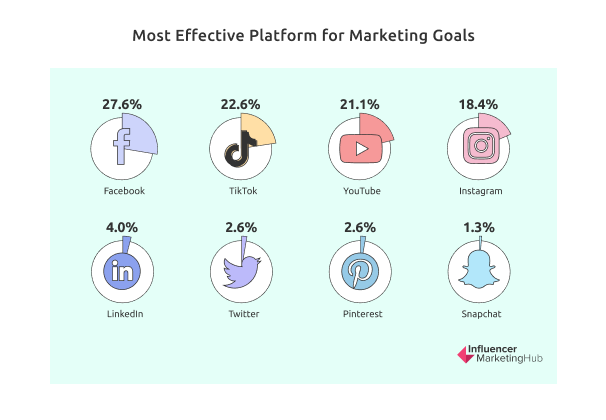

The reduction in the popularity of Instagram for marketing reflects concern reported by the Wall Street Journal, that support for the platform was falling overall, partly because of the upsurge in TikTok’s popularity. Instagram engagement is declining, with Reels seeing a significant drop-off in user engagement. However, this doesn’t appear to have affected support for fellow Meta app, Facebook.
Unlocking Engagement with Effective Content Types
In the quest for user engagement, the type of content created and shared on social media plays a pivotal role. Videos (55.1%), and short-form videos such as TikTok, Instagram Reels, and YouTube Shorts (38.4%), reign supreme in this aspect. These mediums cater to the users’ growing preference for dynamic, immersive, and easily digestible content, hence enhancing user engagement and encouraging further interaction.
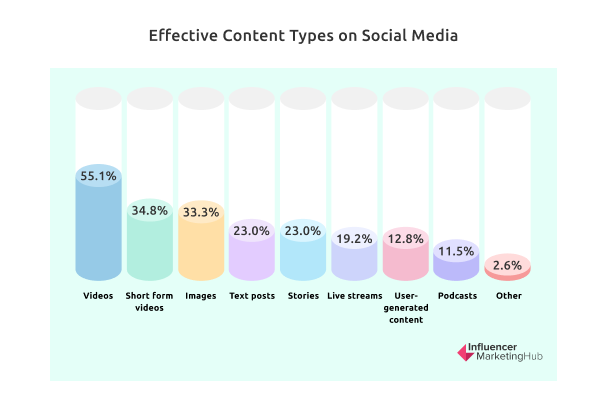

Emerging Technologies: AI Takes the Lead
In the evolving landscape of social media marketing, emerging technologies hold the key to staying ahead of the curve. The use of Artificial Intelligence (AI) for content creation or curation (43.6%) and customer service, such as chatbots (37.2%), is gaining traction. These AI applications promise enhanced efficiency, improved content relevance, and a more personalized user experience. Live shopping features and influencer partnerships also feature prominently, marking an emerging trend of interactive and influencer-led marketing strategies.
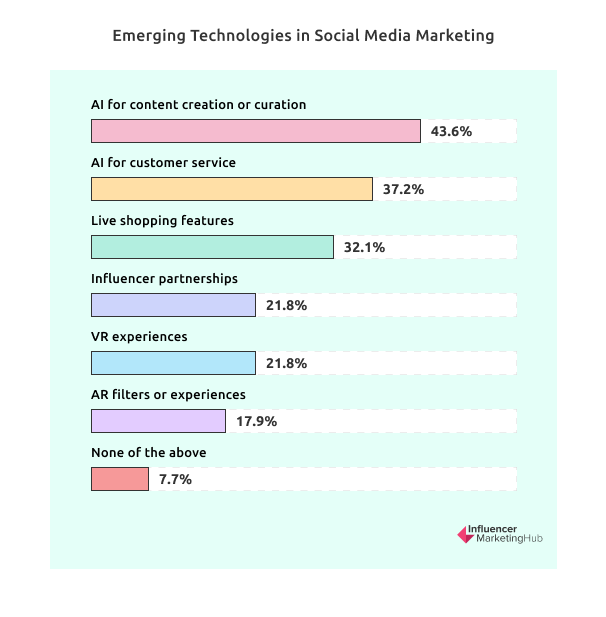

The Challenges of Social Media Marketing
While social media offers vast potential for marketing, it also presents unique challenges. Building a sustained following (43.6%) and keeping up with algorithm changes (42.3%) emerge as the most significant challenges, given the platforms’ continuous evolution and optimization. Encouraging engagement is also a notable concern, underscoring the importance of consistency, relevance, and innovation in content strategy. Adapting to new technologies and dealing with negative feedback are further hurdles that marketers face, highlighting the need for robust crisis management protocols and continuous learning.
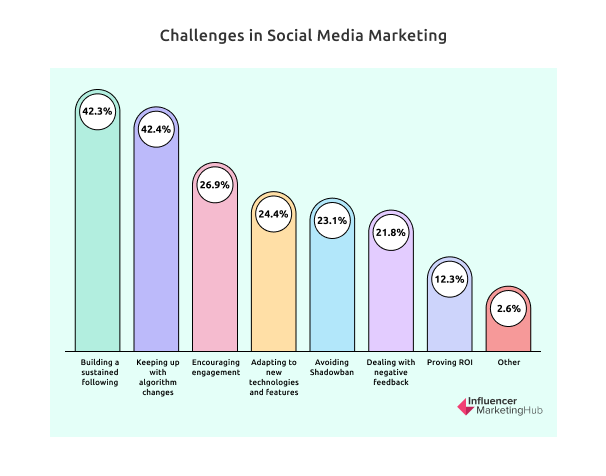

Predicting the Future: Social Media’s Role in Marketing Strategy
Looking forward, businesses anticipate an increased reliance on social media in their marketing strategies. A substantial 52.6% predict a significant increase in the role of social media, while a further 21.1% expect a slight increase. This trend aligns with the ongoing digital transformation and the growing emphasis on personalized, interactive, and consumer-centric marketing.
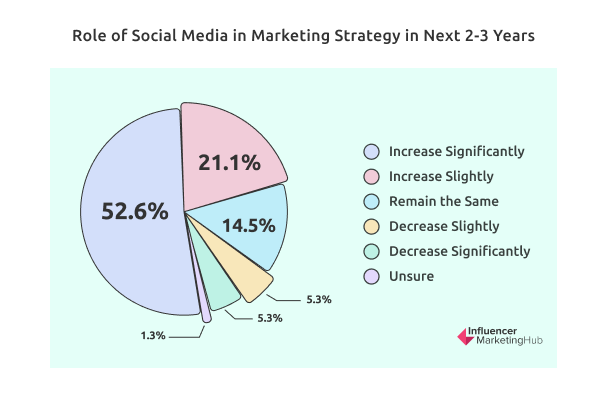

Part 3 – Summarized
- Social Media Platforms Used for Marketing Activities
TikTok, Facebook, YouTube, and Instagram are the most used platforms for marketing activities, with 54.6%, 46.2%, 41.0%, and 38.5% usage respectively. Instagram has notably fallen out of favor this year. - Most Effective Platform for Marketing Goals
Facebook is the most effective platform for achieving marketing goals (27.6%), followed by TikTok (22.4%), YouTube (21.1%), and Instagram (18.4%). Although TikTok has risen greatly in use, Facebook is still considered more effective. - Effective Content Types on Social Media
Videos (55.1%) and short-form videos (38.4%) are the most effective content types on social media. - Emerging Technologies in Social Media Marketing
AI for content creation or curation (43.6%) and AI for customer service (37.2%) are the leading emerging technologies in social media marketing.
Part 4 – Data and Analytics: Steering Digital Marketing Efforts with Insights
The Fourth Pillar: Data and Analytics
The world of data and analytics in digital marketing is complex and ever-evolving. The rapid adoption of GA4, recent changes in Google’s advertising ecosystem, and the growing emphasis on KPIs and analytics tools underscore the importance businesses place on data-informed decisions.
As digital landscapes continue to evolve, businesses must also adapt and evolve, sharpening their analytical capabilities, and leveraging insights to inform their digital marketing strategies. The shift to GA4, awareness of SEO implications due to Google’s automation, and preparedness for Google Merchant Center’s evolution highlight the dynamic nature of the field and the agility of businesses operating within it.
Key Performance Indicators (KPIs): The Metrics That Matter
When tracking digital marketing efforts, most companies prioritize engagement metrics (23.7%) and conversions (17.1%). Engagement metrics, which include likes, shares, comments, etc., act as a mirror, reflecting how audiences are interacting with the content, while conversions directly measure the effectiveness of a campaign in driving desirable actions. These metrics combined help businesses assess the efficiency and effectiveness of their strategies and recalibrate them for optimal performance.
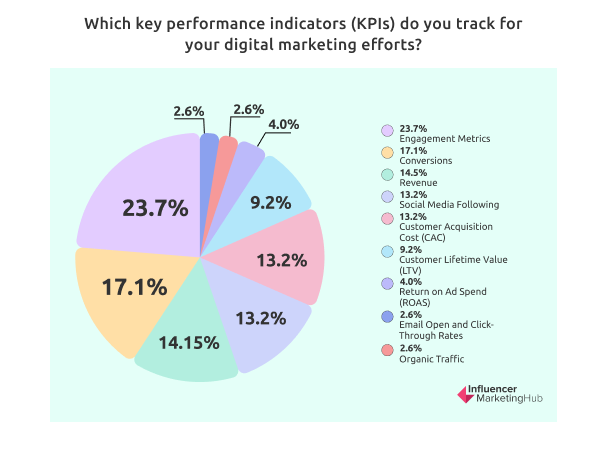

The Power of Analytics Tools
To measure these KPIs, companies rely primarily on social media platform analytics (60.3%) and Google Analytics (39.7%). Social media analytics tools, like Facebook Insights and Twitter Analytics, offer a snapshot of a brand’s social media performance, illuminating user behavior, preferences, and digital marketing trends. Google Analytics, on the other hand, provides comprehensive insights into website traffic and user behavior, allowing businesses to fine-tune their strategies for increased engagement and conversions.
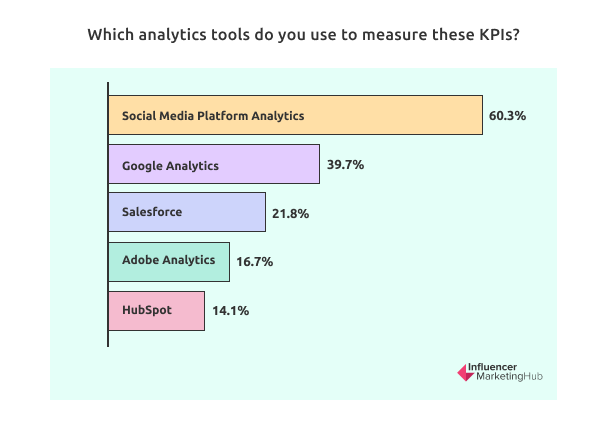

The Shift to Google Analytics 4 (GA4)
With the arrival of Google Analytics 4 (GA4), just over half of businesses (50.7%) have transitioned. Surprisingly, with GU4 now fully operational, many of our respondents are still either in progress (18.2%) or haven’t started the transition (22.1%). It is concerning that so few of the respondents have a fully operational GA4 at this stage, considering Google no longer updates its earlier Universal Analytics.
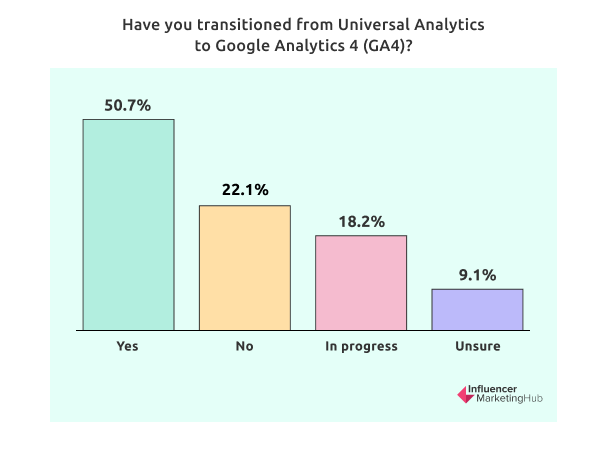

Among the companies that have made the transition, 40.8% reported a complete understanding and comfortability with GA4, while 39.5% are still getting familiar with the platform’s features. This highlights the gradual but definitive shift toward GA4 and the need for continued education and resources to support this transition.
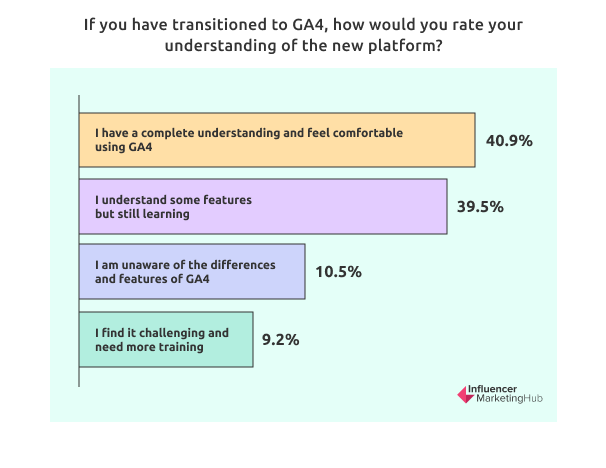

For those who haven’t transitioned, the reasons vary. A lack of awareness about GA4 (36.4%) and being unsure of the benefits of upgrading (20.8%) were reported as the main obstacles, although a sizable percentage reported that they are planning to upgrade soon (23.4%). This highlights a gap in understanding and skill that needs to be addressed to fully leverage the capabilities of GA4.
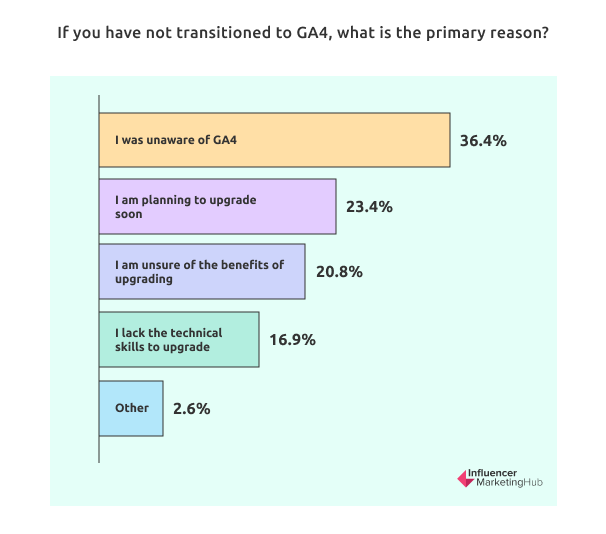

Google’s Advertising Ecosystem Changes: Implications and Preparations
Businesses are acutely aware of the implications of Google’s evolving advertising ecosystem on their SEO strategies. A significant percentage (39.7%) believe these changes will have a major impact and are already preparing for this evolution. This reflects the understanding that SEO is not a static endeavor and must evolve alongside changes in the search engine landscape. This year, the percentage who identify as Unsure (7.7%) is well down on last year, suggesting that most business owners have at least thought about the changes.
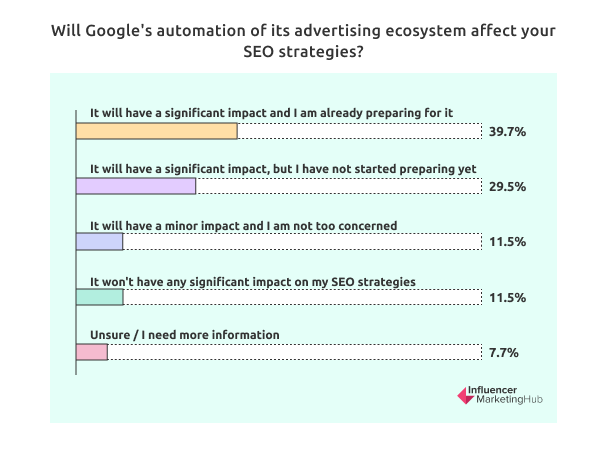

One significant change is Google’s move to extract copy and creative directly from landing pages. In response, a majority of businesses (53.8%) reported being fully prepared and have begun testing the new features associated with this change. This readiness demonstrates a proactive approach to adapting to and leveraging upcoming changes for strategic advantage.
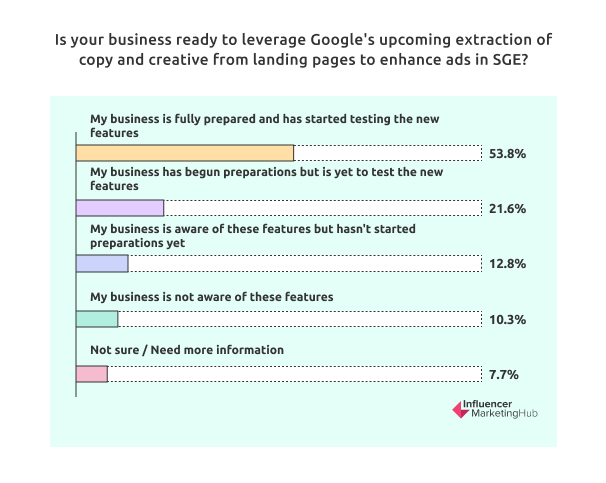

The next evolution of Google’s Merchant Center, which will eliminate the requirement for a product feed, also requires businesses to prepare. Again, a significant number of businesses (44.9%) reported being fully prepared and have made necessary changes to their schema markup, demonstrating adaptability in the face of evolving requirements
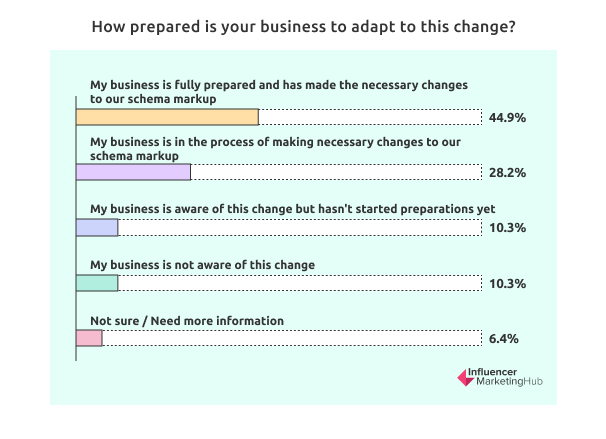

Comparing the Performance Across Marketing Channels
In comparing the performance of different marketing channels, businesses employ various methods. Customer feedback and surveys (61.5%) lead the way, followed by direct comparison of KPIs (35.9%), and attribution modeling (34.36%).
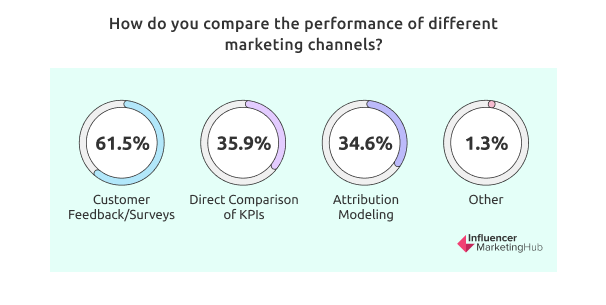

Customer feedback and surveys offer invaluable insights into user experience, perception, and satisfaction, which directly correlate with a brand’s credibility, reputation, and growth. Therefore, it’s not surprising that more than half of the businesses surveyed consider this to be a leading method to compare marketing channels.
A direct comparison of KPIs across different marketing channels is also prevalent, with 35.9% of businesses using this approach. This strategy allows companies to understand which marketing efforts are driving results and where resources are best allocated. Whether it’s conversions, engagement, or customer acquisition, comparing KPIs helps marketers align their tactics with business goals, track progress, and iterate strategies for optimal outcomes.
Attribution modeling, used by 34.6% of businesses, is a more sophisticated approach to performance comparison. It involves identifying a sequence of user actions (events or touchpoints) that contribute to a desired outcome and assigning a value to each of these touchpoints. This allows companies to understand the effectiveness of different channels and how they interact with one another on the consumer journey. It helps in formulating a multi-faceted, integrated digital marketing strategy, taking into account all touchpoints in a customer’s journey.
Part 4 – Summarized
- Key Performance Indicators (KPIs)
Most companies prioritize engagement metrics (23.70%) and conversions (17.1%) when tracking their digital marketing efforts. - Analytics Tools
Most companies rely on social media platform analytics (60.3%) and Google Analytics (39.7%) to measure their KPIs. - Transition to Google Analytics 4 (GA4)
While 50.7% have transitioned to GA4, a significant portion are either in progress (18.2%) or haven’t started the transition (22.1%). This is concerning, considering that Google has switched off Universal Analytics (the previous version). - Understanding and Adoption of Google Analytics 4 (GA4)
Among the companies that have transitioned to GA4, 40.9% reported a complete understanding and feel comfortable using GA4, while 39.5% are still learning the platform’s features. On the other hand, companies that haven’t transitioned to GA4 reported a lack of awareness about GA4 (36.4%) and a lack of understanding of the benefits of upgrading (20.8%) as the primary reasons for not making the shift. Pleasingly, 23.4% report that they intend to upgrade soon. - Implications of Google’s Advertising Ecosystem Changes for SEO
A significant percentage of businesses (39.7%) believe that Google’s automation of its advertising ecosystem will have a significant impact on their SEO strategies and are already preparing for these changes. - Preparation for Google’s Copy Extraction and Ad Adjustments
Most businesses (53.8%) reported being fully prepared and have started testing the new features associated with Google extracting copy and creative directly from their landing pages. - Adaptation to the Evolution of the Google Merchant Center
In preparation for Google no longer requiring a product feed, 44.9% of businesses have reported being fully prepared and have made the necessary changes to their schema markup. - Performance Comparison of Different Marketing Channels
Companies mostly compare the performance of different marketing channels through customer feedback/surveys (61.5%), direct comparison of KPIs (35.9%), and attribution modeling (34.6%).
Part 5 – Sustainability and Ethical Considerations
As the world becomes more digital, companies are now acknowledging the significance of sustainable and ethical practices in their digital marketing strategies. With the accelerating rate of technological development and regulatory changes, it’s critical for businesses to stay updated, ethical, and sustainable in their approach to marketing. The rise of sustainability and ethical considerations in digital marketing is a reflection of the growing consumer awareness of these issues. As businesses strive to navigate the complexities of this landscape, the ability to adopt sustainable practices, pivot with the shift to remote work, develop vital digital marketing skills, and uphold data privacy will determine their success in the digital marketing arena. Businesses that can successfully blend profitability with responsibility are likely to emerge as leaders in this new era of digital marketing.
Sustainability in Digital Marketing
Sustainability, a topic that has been garnering global attention, is now being embraced in the digital marketing world as well. According to the data, a majority of companies (59.2%) already incorporate sustainability into their digital marketing strategy, and another 27.6% are in the process of doing so.
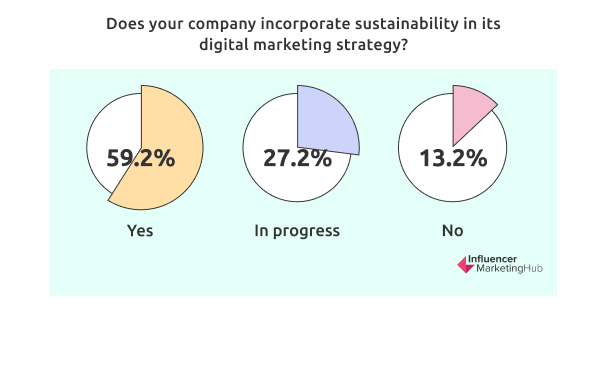

The increased interest in sustainable digital marketing can be attributed to the growing awareness and concern for environmental issues among consumers. More than ever, customers are choosing brands that take active steps towards sustainability. By incorporating sustainability in their digital marketing strategies, businesses not only contribute to the preservation of the environment but also build stronger, more meaningful connections with their target audiences.
This trend towards sustainability in digital marketing can be seen in practices such as reducing digital carbon footprints, creating eco-friendly content, or promoting products or services with minimal environmental impact. Additionally, businesses are adopting energy-efficient web design practices and choosing to host their websites on green servers to minimize their environmental impact.
Impact of Remote Work on Digital Marketing
The shift to remote work, a change driven by the global pandemic, has had a substantial impact on digital marketing practices. A significant 67.1% of companies reported that remote work has positively impacted their digital marketing practices.
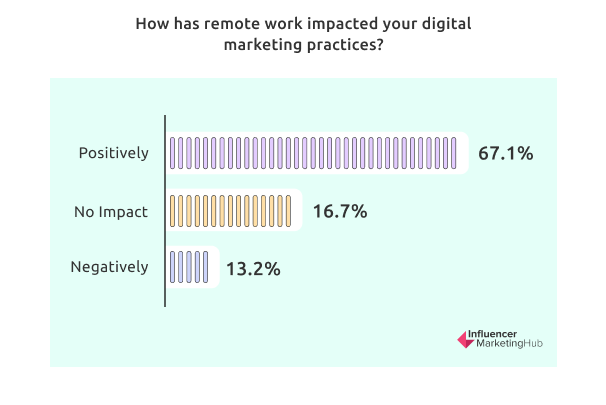

The transition to remote work has allowed companies to tap into a broader talent pool, unrestricted by geographical boundaries, resulting in diverse and creative digital marketing strategies. Furthermore, the shift to remote work has brought about a greater reliance on digital platforms for communication, collaboration, and project management, resulting in improved productivity and efficiency in digital marketing practices.
Crucial Skills for Digital Marketers
The current landscape of digital marketing demands a unique blend of skills. Content creation and storytelling skills are considered the most crucial by 34.2% of the companies, followed by content data analysis and interpretation (25.0%). Surprisingly, considering how many of our respondents see SEO as being the most effective in fulfilling overall marketing objectives, significantly fewer see SEO and SEM skills as crucial (22.4% compared to 35.1% last year).
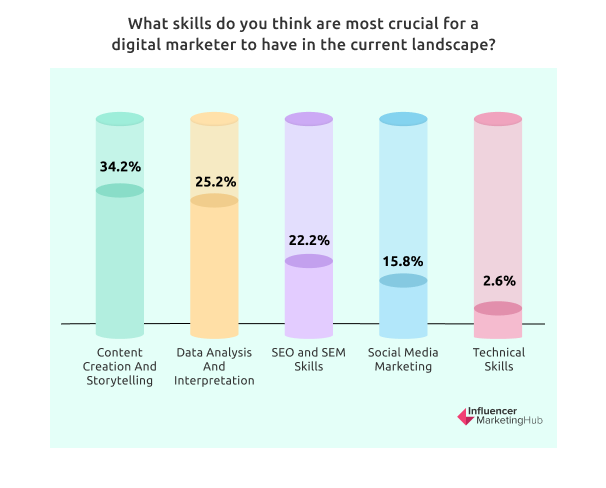

There is now an insatiable demand for content from digital marketers to provide tangible solutions to people’s pain points. Compelling content creation and storytelling are vital for engaging audiences, fostering brand loyalty, and driving conversions. Marketers need to understand whether they are creating the right kinds of content for their audiences, relying on increasingly sophisticated and in-depth data analysis to provide them with the answers.
Addressing Data Privacy Concerns
The importance of data privacy has been thrust into the spotlight with the increasing number of data breaches and the introduction of data protection regulations like GDPR. Companies are now prioritizing the implementation of robust data privacy measures in their digital marketing efforts. Regularly updating privacy policies and making them more transparent is the primary approach taken by 42.1% of companies. A further 30.3% are focusing on implementing strict data handling and storage policies.
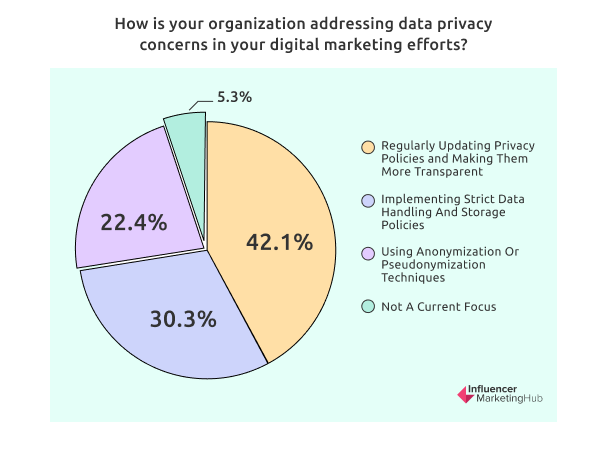

Transparency in privacy policies is crucial in building trust with customers. By providing clear and accessible information about how customer data is used and protected, companies can alleviate customer concerns about data privacy and build a stronger, more trustworthy relationship.
Part 5 – Summarized
- Sustainability in Digital Marketing
A majority of companies (59.2%) incorporate sustainability in their digital marketing strategy, and another 27.6% are in the process of doing so. - Impact of Remote Work on Digital Marketing
The shift to remote work has positively impacted digital marketing practices for 67.1% of companies. - Crucial Skills for Digital Marketers
The most crucial skills for a digital marketer in the current landscape are content creation and storytelling (34.2%) and data analysis and interpretation (25.0%). - Addressing Data Privacy Concerns
To address data privacy concerns, companies are primarily focusing on regularly updating their privacy policies making them more transparent (42.1%), and implementing strict data handling and storage policies (30.0%).
Conclusion
As we draw our 2024 Digital Marketing Landscape Report to a close, we look back upon the insights we’ve gathered and discussed across five key domains: Digital Marketing Channels, Marketing Technologies, Social Media Marketing, Data and Analytics, and Sustainability and Ethical Considerations. Each area presents its own challenges, advancements, and opportunities – underscoring the dynamic and intricate nature of the digital marketing landscape.
1. Digital Marketing Channels
Our exploration of various digital marketing channels illuminated the shifting preferences of marketers and consumers alike. From SEO and SEM to email marketing, content marketing, and more, the channels used by marketers have both broadened and specialized, reflecting a diverse range of customer engagement strategies. The effectiveness of these channels varies, driven by factors such as business model, target audience, and market sector. Looking forward, we anticipate further channel diversification as businesses strive to connect with their audience across an increasing number of digital touchpoints.
2. Marketing Technologies
Artificial Intelligence and machine learning continue to redefine the marketing technology landscape. A staggering 71.8% of survey respondents are either using or planning to use AI-driven marketing technologies. This trend signifies the rising reliance on advanced technologies for tasks such as data analysis, customer segmentation, and personalized content generation. Despite the optimism, it’s important to be cognizant of potential roadblocks, including data privacy issues and the requisite technical expertise. Hence, businesses need to strike a balance between leveraging technology for efficiency and maintaining a human-centric approach to marketing.
3. Social Media Marketing
Social media has undoubtedly cemented its position as a crucial marketing platform. Newer platforms like TikTok are gaining traction, challenging the supremacy of established players like Facebook and Instagram. With over 60% of marketers planning to integrate AI or ML in their social media campaigns, the potential for personalization and targeted marketing is immense. The rapid changes in this sector demand that marketers stay agile and innovative, constantly adapting their strategies to resonate with shifting user behaviors and preferences.
4. Data and Analytics
The importance of data and analytics has never been more pronounced. Businesses are leveraging data to inform strategy, identify opportunities, and measure performance. Nearly half of the surveyed businesses are investing in advanced data analytics tools, signaling the growing recognition of data-driven decision-making. However, navigating the world of data analytics is not without its challenges. Privacy concerns, data quality issues, and the lack of skilled personnel can pose significant hurdles. Going forward, businesses need to prioritize data governance and literacy to fully harness the potential of data analytics.
5. Sustainability and Ethical Considerations
Our exploration concluded with the sustainability and ethical dimensions of digital marketing. While technology has enabled unprecedented reach and personalization, it also raises questions about data privacy, misinformation, and environmental impact. Nearly 69% of our respondents recognized the importance of ethical considerations in their marketing practices. This awareness signals a growing commitment to responsible and sustainable marketing practices. As we move forward, the integration of ethics and sustainability within the marketing strategy is expected to become the norm rather than the exception.
As we’ve traversed through these key areas, a consistent theme emerges – the digital marketing landscape is characterized by rapid change, driven by technological advancements and evolving consumer behaviors. However, this fluidity brings not only challenges but also opportunities for innovation and growth. The future of digital marketing may be uncertain, but one thing is clear: it will continue to be a fascinating and dynamic field, ever-responsive to the changing digital milieu.
In conclusion, the overarching insight from our study is that while technology is a powerful enabler, the human element remains at the core of marketing. Balancing the capabilities of technology with a deep understanding of human needs, values, and experiences will be key to successful marketing in the future.
Assumptions, Limitations, and Sensitivities of the Survey Data
Our research provides a comprehensive overview of digital marketing. However, as with any study, there are certain limitations and assumptions to consider. The pace of innovation in this field, along with the diversity of strategies and tools adopted by individual businesses, introduces a level of unpredictability and complexity into our analysis.
We base our findings on current practices and strategies, not anticipating shifts that may occur over time. Future technologies, evolving strategies, and emerging roles within the digital marketing landscape are not factored into our research.
The investigation is confined to the direct effects of digital marketing strategies and tools. We haven’t delved into potential shifts in labor rates, changes in labor force participation, or other macroeconomic effects that may ensue from technological advancements in digital marketing. We have attempted to account for adoption timelines for technologies, but these can greatly vary across businesses and sectors.
We acknowledge that our evaluation of technology capabilities is based on current expert opinions and research, which could evolve rapidly due to the dynamic nature of digital marketing technologies.
Our report refers to historical data that suggests a technology adoption curve, which typically spans eight to 27 years. However, the rate of adoption could be faster for some technologies relevant to digital marketing due to ease of deployment.
We must clarify that our analysis does not equate the degree of automation with potential job losses. Technological advances typically impact individual activities within occupations rather than eliminate whole occupations. Nevertheless, businesses may leverage enhanced productivity to reduce staffing in some areas.
Our survey data primarily reflect the experiences and perspectives of startups, and this demographic concentration might not fully encapsulate the experiences of larger or more established businesses. This skew could influence our findings, perhaps placing more emphasis on the specific challenges and priorities faced by newer, smaller businesses.
In acknowledging these limitations, we aim to present a well-rounded and contextualized view of the current state of digital marketing. While it provides an informed perspective, it represents a snapshot in time of a rapidly evolving landscape.
Survey Demographics
The respondents of our survey consist of 500 marketers with diverse roles, primarily Managers (44%), Specialists (13%), and C-level executives (14%). They bring a variety of perspectives, representing different company sizes, with the majority hailing from companies with 1-50 employees (74%), while others represent larger organizations with 500+ employees (18%). Our pool of respondents has a rich mixture of experience levels in the field of Digital Marketing. The largest group has 0-1 years of experience (47%), followed by those with 1-5 years of experience (21%), and a sizable representation from those with 6-10 years and 10+ years of experience. As part of our commitment to obtaining a well-rounded perspective on the topic, we ensured our respondents included both seasoned veterans and those new to the field, thereby enriching our understanding of the current state of digital marketing.
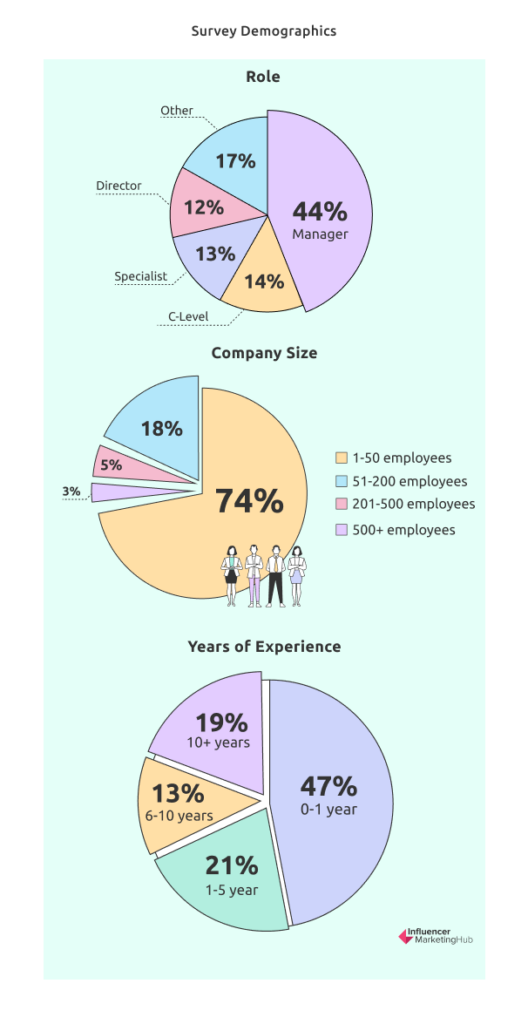

Note: All figures are approximate. Percentages may not sum to 100 due to rounding.


